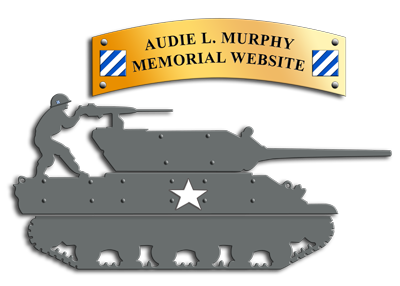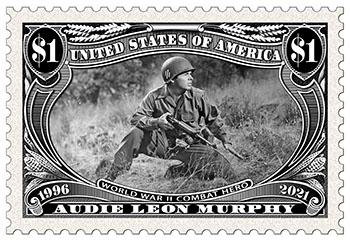|
Texas House Concurrent Resolution 3 Expressing Admiration For Audie Murphy and Condolences to Family
|
WHEREAS, Audie Murphy, the 46-year-old native Texan who was America's most decorated World War II hero, was killed in a tragic airplane crash in the mountains of Virginia on May 28, 1971; and
WHEREAS, One of nine children, Audie Leon Murphy was born to sharecropper parents, Emmet and Josie Murphy, on a farm near Kingston in North Central Texas on June 20, 1924; before he reached school age, his family moved to the nearby community of Farmersville, where he grew up; and
WHEREAS, As a youngster, he often shined shoes in order to earn extra income for his family; to help provide food, he hunted game, and the small amount of money available for ammunition partly accounted for the remarkable accuracy he developed with a gun; and
WHEREAS, When Audie Murphy was 12, his father disappeared, and he had to leave school and go to work on a farm as a hired hand; when the farming season ended, he worked as a clerk in a grocery store-service station for $12 a week; and
WHEREAS, After his mother died following a long illness in 1940, he went to Greenville to work in a radio repair shop; there, when returning from squirrel hunting one day in December of 1941, he learned from a mail carrier that the Japanese had bombed the American base at Pearl Harbor; and
WHEREAS, Not even knowing the location of Pearl Harbor, but indignant nevertheless over such a treacherous and unprovoked attack, this 17-year-old, five-feet, five-inches tall young American, immediately tried to join the armed forces; he falsified his age, but his boyish face gave him away to recruiters; he had to wait until he was 18 to join, and even then the Marines would not take him because he weighed less than the required 115 pounds; and
WHEREAS, He enlisted as a private in the United States Army and was sent as a replacement to Company B, 1st Battalion, 15th Regiment, 3rd Infantry Division, in which he served throughout the war; and
WHEREAS, During the war, he was to become one of the only two men in the history of our nation to receive every decoration for valor the United States offers, including the Congressional Medal of Honor - our nation's highest combat decoration -- and the Silver Star, which he won twice; these, together with medals awarded by other countries, totaled 24; and
WHEREAS, Private Murphy saw his first action as an infantryman in North Africa; he received his first citation, the Bronze Star, for destroying a German tank during the campaign in southern Italy; he was awarded a battlefield commission as a second lieutenant and was promoted to first lieutenant before the end of the war; and
WHEREAS, He became the nation's war idol when, on one winter afternoon in France in 1944, he climbed atop a burning tank destroyer loaded with explosives to hold off an advancing company of German infantry with a .50 caliber machine gun; and
WHEREAS, The Medal of Honor citation he received for the act stated: "He was alone and exposed to German fire from three sides, but his deadly fire killed dozens of Germans and caused their infantry attack to waver"; and
WHEREAS, His career in the United States Army included 390 days on the front lines during which he was wounded three times; his valorous actions included killing of capturing an entire enemy garrison at St. Tropez Bay, aiding his battalion in destroying 500 vehicles in a German convoy at Montelimar, France, wiping out a machine gun next in the Vosges Mountains, and killing 15 Germans and wounding 35 others while capturing an enemy position near Cleurie; in all, he is credit with killing, wounding, or capturing as many as 240 German soldiers; and
WHEREAS, After the war, his first desire was to return to the peace of the Texas countryside, but his immense popularity attracted the attention of Hollywood movie producers; he was persuaded to go to the Hollywood and star in a movie, "To Hell and Back," an autobiographical account of his war deeds and the only known case of an actor portraying himself; and
WHEREAS, He also appeared in "The Red Badge of Courage," "The Quiet American," dozens of westerns, and a detective series on television in 1961; nevertheless, he always remained astonishingly modest about his successful movie career; and
WHEREAS, This native son was honored by the Texas Legislature on his return from Europe near the close of World War II, and his portrait hangs in the office of the Sergeant-at-Arms of the House of Representatives; and
WHEREAS, Although his sudden passing brings great sadness to people across our land, Audie Murphy will continue to serve as an inspiring example of heroism to Americans of all ages; now, therefore, be it
RESOLVED, by the House of Representatives of the State of Texas, the Senate concurring, That the 62nd Legislature, First Called Session, pay tribute to a valiant soldier and patriot, Audie Murphy, and extend sympathy to his wife, Pamela, and to his sons Terry and "Skipper," of North Hollywood, California; and, be it further
RESOLVED, That official copies of this Resolution be prepared for his family as an expression of sympathy from the Texas Legislature, and that when the Senate and House of Representatives adjourn this day, they do so in memory of Audie Murphy, a great American war hero and one of the most famous of all Texans.
|







